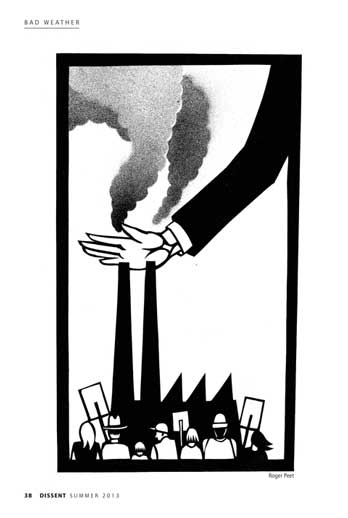
This is the third of three posts on the Inside/Outside Strategy. Also, see the first and second posts in the series at Democracy Chronicles.
Do we want to win the argument or build the movement?
The search for the “right line” or debates about the “agent of history” continues to shape the inner life of radical movements and consumes tremendous energies better spent organizing.

Perhaps the first step is simply to appreciate the efforts of people and organizations along a range of political and institutional positions. We all need to push or pull. Bruise your hands on the levers you find most useful. Really get to know how hard this is. Look up and down the political terrain and recognize others pushing or pulling in the same direction, even if not in the same way.
In, Climate of Change: What Does an Inside-Outside Strategy Mean?, Mark Engler and Paul Engler present a cogent and insightful account of the efforts to cap carbon emissions. Their well-researched essay is one of the best accounts of how the IOS can be used as a way of understanding politics. They rightly acknowledge the primacy of grassroots movement at this time in history — a movement that successfully shuts down coal plants without national legislation. Also useful, they recap theoretical differences between “transformational” and “transactional” leadership.
“Transformational” leadership engages followers in the risky and often exhilarating work of changing the world, work that often changes the activists themselves. Its sources are shared values that become wellsprings of the courage, creativity and hope needed to open new pathways to success. “Transactional” leadership, on the other hand, is about horse-trading, operating within the routine, and it is practiced to maintain, rather than change, the status quo.
The standard-issue transactional leader is not a useful role within the inside/outside strategy. Both inside and outside must be committed to social transformation for the IOS to work. Outside leaders do not necessarily have to see themselves as revolutionaries and inside leaders should definitely not maintain the status quo. But, the tendency to resort to “either/or” dichotomies does suggest just how challenging the inside/outside strategy can be and just how far we have yet to go on our way to “both/and” understandings.
The Progressive Democrats of America have self-consciously adopted IOS as a way of influencing the Democratic Party. Watch this informative panel discussion:
Congress members Mark Pocan (WI), Raul Grijalva (AZ), Lori Wallach from Public Citizen Global Trade Watch and radio host Thom Hartmann discuss their work tugging the Democrats toward reason. It sheds light on how IOS is applied to legislative efforts over issues ranging from the TPP trade agreement, to GLBTQ issues, and immigration but also helps to clarify the basic principles of IOS.
The authors and panelist conclude that the best medicine is a vigorous movement, broad and rebellious enough to change public opinion and bring pressure to bear on movement insiders, politicians and big corporate interests. Agreed.
In the early 20th century, socialists, communists and anarchists set out to radicalize unions and created an early form of the IOS. While a radical wing of the Socialist Party and anarchists set out to organize a new radical union called the Industrial Workers of the World, (IWW) communists and socialists attempted to sway the members of existing unions.
Dubbed “boring from within and boring from without” these two strategies were often viewed by contemporaries as stark opposites used by competing groups ideologically hostile to one another. Some of the most influential leaders such as Big Bill Haywood and Elizabeth Gurley Flynn tried to bridge the gap keeping one foot “in” and the other “out. This useful essay, complete with historical sources, offers a spirited argument in keeping with the original controversy.
In an important essay, A Model for Analyzing the Strategic Options of Social Movement Organizations, movement veteran Jo Freedman recalls and analyzes Second Wave Feminism. Freeman contrasts the personal politics of more youthful, decentralized organizations with national groups like NOW focused on lobbying and specific policy targets.
Freeman’s insights and evaluations are consistent with an IOS approach. Particularly valuable is the idea that “the most viable movement is one that has several organizations that can play different roles and pursue different strategic possibilities.”
Both/and or either/or?
We might also learn from the successful approach to IOS revived by the civil rights movement that was also fundamental to the labor unrest of the 1930s.
Martin Luther King caught the productive tension within the IOS in his “Letter from Birmingham Jail.” In trying to explain civil disobedience he wrote,
“The purpose of our direct-action program is to create a situation so crisis-packed that it will inevitably open the door to negotiation.”
Both are necessary. If there is no outside disruption, then there can be no inside negotiation. This seemingly simple insight transformed social movement activism through conscious, purposeful coordination and should become our strategic touchstone.
IOS is a means of seeking unity without uniformity, of passing beyond the limits of analysis that sees only the stark dichotomies of right or wrong.
I am not suggesting that people abandon their political judgments, quite the contrary. But, political critiques and judgment should be embodied as action. Experiment and experience with the people are the best first steps to find the truth. Then, we need to study the results of our experiments and return to organizing and protest.
In US history, people’s movements usually lack a stable center but we often talk as if we have one, are one, or should create one. Instead, we should start by finding strength and creativity in the poly-centered, local and decentralized movement we actually have. Stop distracting ourselves on debate detached from action. We should focus instead on projects that give actual life to our communities, principles and ideas.
Important strategic decisions are often made by small groups of dissenters. Ferguson and Occupy sparked broader movements with local initiative. In the mid-20th century small groups of young blacks and women invented the lunch counter sit-ins and consciousness-raising groups that ignited the civil rights and feminist movements.
Yes, we need to build stronger capacity for coordination. Coordination begins with assessing the state of the movement. We have much more to work with if we first recognize the value in other movements. We have no choice except to use the resources at hand as the precondition for the next step.
Social change activism or prefigurative politics, inside the house or out in the street, our common interest in transforming America should lead to mutual respect, greater solidarity, and in time, a more conscious use of IOS.
Leave a Reply